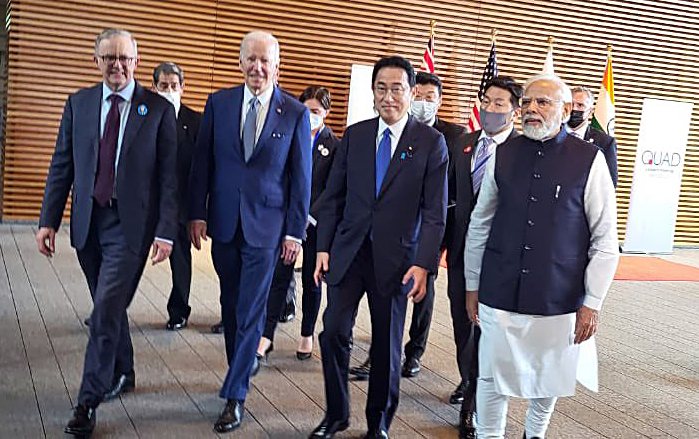To defend the Himalayas, India must play a commanding role in the Indo-Pacific, which requires pro-active strategic engagement with the region rather than passive strategic autonomy. The Quad, the Quadrilateral Security Dialogue, composed of India, the United States, Japan, and Australia, provides a security and economic platform to create a new balance of power structure in the Indo-Pacific region, keeping in mind China’s overarching and aggressive ambitions from Taiwan, the South China Sea, the Indian Ocean to the Himalayas.
Any day and time, China can rattle the Indian psyche by launching a mini attack on a hilltop or a river valley anywhere on the Line of Actual Control (LAC) on the Himalayan borders. By making minuscule military maneuvers and micro-aggressions in the vastness of the 3,400 km northern borders, China has been making Indians feel perpetually insecure. It has been doing so by making false territorial claims and nibbling Indian territory all along the northern borders. The world takes notice only when the conflict seems to get out of control as it happened in the Galwan River Valley in Ladakh in June 2020 when 20 Indian soldiers were killed in the bloody clash with Chinese troops.
China, however, could not ignore the recent happening in the Himalayas when Indian and US troops teamed up to train in the cold weather 10,000 feet high altitude conditions. The annual joint military exercise, Yudh Abhyas, took place in Auli in Uttarakhand, less than 100 km close to the LAC, with China (Tibet). It was a clear message to China about the India-US growing military relations in the Indo-Pacific of which the Himalayas is an integral part. As the US Army Pacific tweeted, “Yudh Abhyas reinforces our commitment to the Indo-Pacific region and improves interoperability with our Indian Army partners.” China protested but India ignored; and claimed that the two-week exercise was for humanitarian assistance, disaster relief, peacekeeping, and peace enforcement—which in fact was the initial impulse behind the Quad, when it was established in 2004 for the Indian Ocean tsunami relief efforts.
However, the Quad in its 2017 avatar became a totally new entity, a flexible non-alliance group of four flourishing democracies that saw convergence of their national interests, especially in the face of China’s aggressive assertiveness. Maritime security, infrastructure connectivity and counterterrorism were the issues that the official-level meetings focused on after its revival.
But the Biden administration saw a new role for the Quad in its Indo-Pacific policy towards China. In March 2021, the United States convened the first Quad leaders’ summit, which gave the group a new vision and purpose that would serve the national interest and diplomatic goals of the Narendra Modi administration, Japan and Australia, as well as the Indo-Pacific region as a whole.
By the end of the second leaders’ summit meeting held in September 2021, the group’s institutional structure took a concrete shape and consisted of several working groups, including: the Quad Vaccine Group for producing and delivering a billion Covid-19 vaccine doses for the Indo-Pacific region produced by the Biological E. Ltd (India); the Critical and Emerging Technology Working Group focusing on open, accessible, secure, critical, diversified technology supply chains system; the Climate Working Group focusing on greening the shipping supply chains and disaster risk reduction; the Infrastructure Group aiming at digital connectivity, clean energy, and transport infrastructure in the Indo-Pacific; the Quad Cybersecurity Partnership for developing capabilities for meeting cyber threats, infrastructure and supply chain resilience, and software security standards; the Space Working Group for pooling and sharing satellite data, and monitoring and mitigating climate emergencies; and the Indo-Pacific Partnership for Maritime Domain, launched at the Tokyo summit in May 2022, aiming at enabling the partners to surveil the critical regions of the Indo-Pacific for tactical activities including dark shipping (vessels with automatic identification system turned off), responding to climate and humanitarian contingencies, and protecting marine resources.
The Quad’s geopolitical dynamism in the region continues to grow. The Quad partners with shared democratic values, operating through highly integrated working groups, and focusing on not only traditional and non-traditional security issues but equally importantly on trade and economic issues, have begun to transform the organization into a force for peace and stability and economic growth for the Indo-Pacific region. The Quad has created an effective system of balance of power in the Indo-Pacific to keep the region secure, open, and accessible for trade and commerce. More importantly, the Quad partners’ economic dynamism based on democratic values provides an alternative to Chinese authoritarian model.
India’s commitment and contribution to the Quad’s growth, success, and continuity serves its national interest not only in security and diplomacy areas especially in regard to its unending problems with China; but also for its goal of rapid economic growth to become a 5 trillion-dollar economy in the next few years.
It’s India’s remarkable diplomatic achievement that its dubious posture toward Russia’s aggression against Ukraine and its continuous oil imports and trade relations with Russia have not adversely affected its standing with the Quad partners. The Quad has pivoted India to the Indo-Pacific and India must keep it strong and vibrant.
Dr Narain D. Batra is the author of several books including the most recent India In A New Key: Nehru To Modi: 75 Years of Freedom and Democracy. He is affiliated with the diplomacy and international relations program in the graduate college at Norwich University, US.
Quad pivots India to the Indo-Pacific
- Advertisement -

